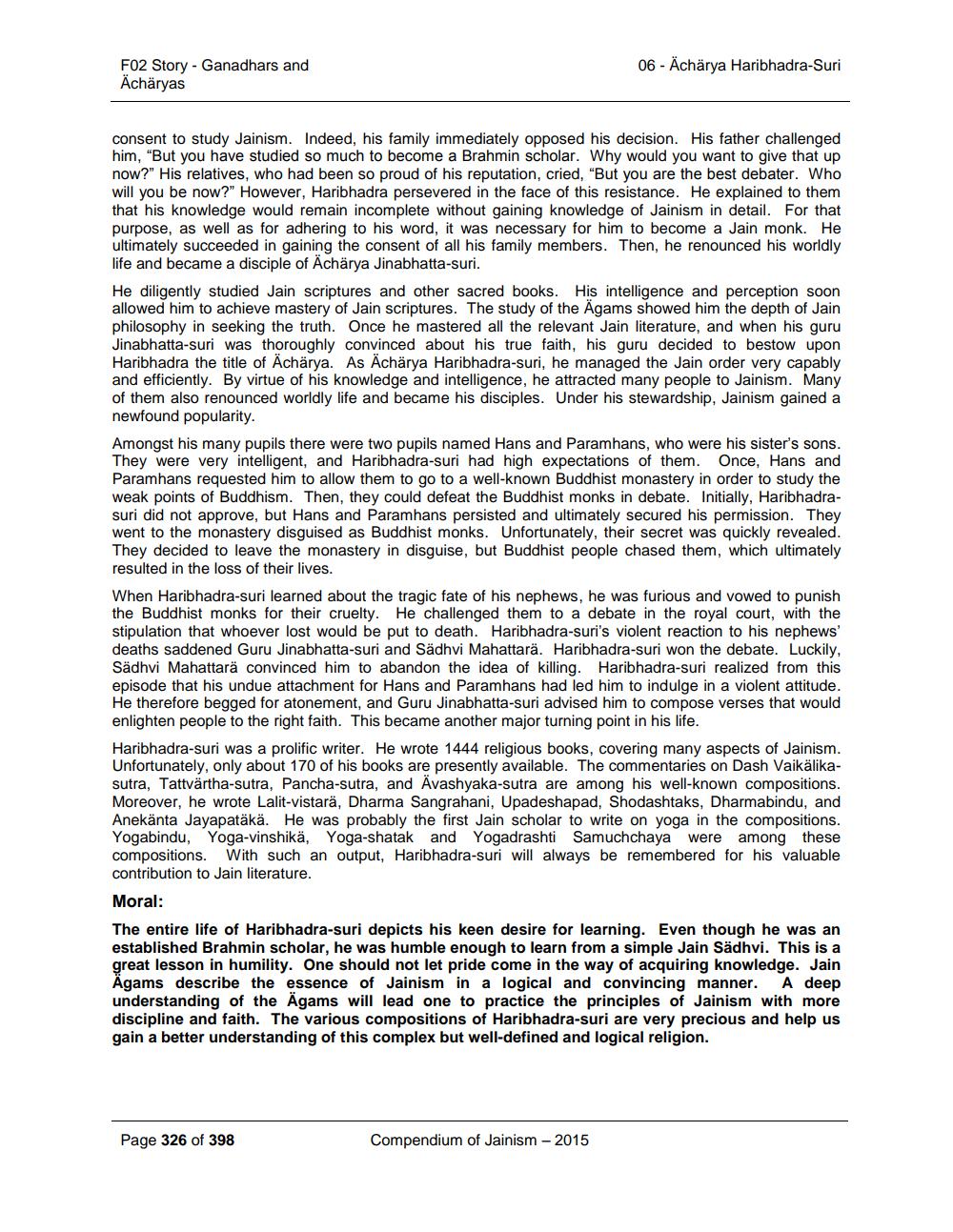________________
F02 Story - Ganadhars and Ächäryas
06 - Ächärya Haribhadra-Suri
consent to study Jainism. Indeed, his family immediately opposed his decision. His father challenged him, “But you have studied so much to become a Brahmin scholar. Why would you want to give that up now?" His relatives, who had been so proud of his reputation, cried, "But you are the best debater. Who will you be now?" However, Haribhadra persevered in the face of this resistance. He explained to them that his knowledge would remain incomplete without gaining knowledge of Jainism in detail. For that purpose, as well as for adhering to his word, it was necessary for him to become a Jain monk. He ultimately succeeded in gaining the consent of all his family members. Then, he renounced his worldly life and became a disciple of Acharya Jinabhatta-suri. He diligently studied Jain scriptures and other sacred books. His intelligence and perception soon allowed him to achieve mastery of Jain scriptures. The study of the Agams showed him the depth of Jain philosophy in seeking the truth. Once he mastered all the relevant Jain literature, and when his guru Jinabhatta-suri was thoroughly convinced about his true faith, his guru decided to bestow upon Haribhadra the title of Acharya. As Acharya Haribhadra-suri, he managed the Jain order very capably and efficiently. By virtue of his knowledge and intelligence, he attracted many people to Jainism. Many of them also renounced worldly life and became his disciples. Under his stewardship, Jainism gained a newfound popularity. Amongst his many pupils there were two pupils named Hans and Paramhans, who were his sister's sons. They were very intelligent, and Haribhadra-suri had high expectations of them. Once, Hans and Paramhans requested him to allow them to go to a well-known Buddhist monastery in order to study the weak points of Buddhism. Then, they could defeat the Buddhist monks in debate. Initially, Haribhadrasuri did not approve, but Hans and Paramhans persisted and ultimately secured his permission. They went to the monastery disguised as Buddhist monks. Unfortunately, their secret was quickly revealed. They decided to leave the monastery in disguise, but Buddhist people chased them, which ultimately resulted in the loss of their lives. When Haribhadra-suri learned about the tragic fate of his nephews, he was furious and vowed to punish the Buddhist monks for their cruelty. He challenged them to a debate in the royal court, with the stipulation that whoever lost would be put to death. Haribhadra-suri's violent reaction to his nephews' deaths saddened Guru Jinabhatta-suri and Sadhvi Mahattarä. Haribhadra-suri won the debate. Luckily, Sadhvi Mahattarä convinced him to abandon the idea of killing. Haribhadra-suri realized from this episode that his undue attachment for Hans and Paramhans had led him to indulge in a violent attitude. He therefore begged for atonement, and Guru Jinabhatta-suri advised him to compose verses that would enlighten people to the right faith. This became another major turning point in his life. Haribhadra-suri was a prolific writer. He wrote 1444 religious books, covering many aspects of Jainism. Unfortunately, only about 170 of his books are presently available. The commentaries on Dash Vaikälikasutra, Tattvärtha-sutra, Pancha-sutra, and Avashyaka-sutra are among his well-known compositions. Moreover, he wrote Lalit-vistarä, Dharma Sangrahani, Upadeshapad, Shodashtaks, Dharmabindu, and Anekänta Jayapatäkä. He was probably the first Jain scholar to write on yoga in the compositions. Yogabindu, Yoga-vinshikä, Yoga-shatak and Yogadrashti Samuchchaya were among these compositions. With such an output, Haribhadra-suri will always be remembered for his valuable contribution to Jain literature.
Moral:
The entire life of Haribhadra-suri depicts his keen desire for learning. Even though he was an established Brahmin scholar, he was humble enough to learn from a simple Jain Sädhvi. This is a great lesson in humility. One should not let pride come in the way of acquiring knowledge. Jain Agams describe the essence of Jainism in a logical and convincing manner. A deep understanding of the Agams will lead one to practice the principles of Jainism with more discipline and faith. The various compositions of Haribhadra-suri are very precious and help us gain a better understanding of this complex but well-defined and logical religion.
Page 326 of 398
Compendium of Jainism - 2015




